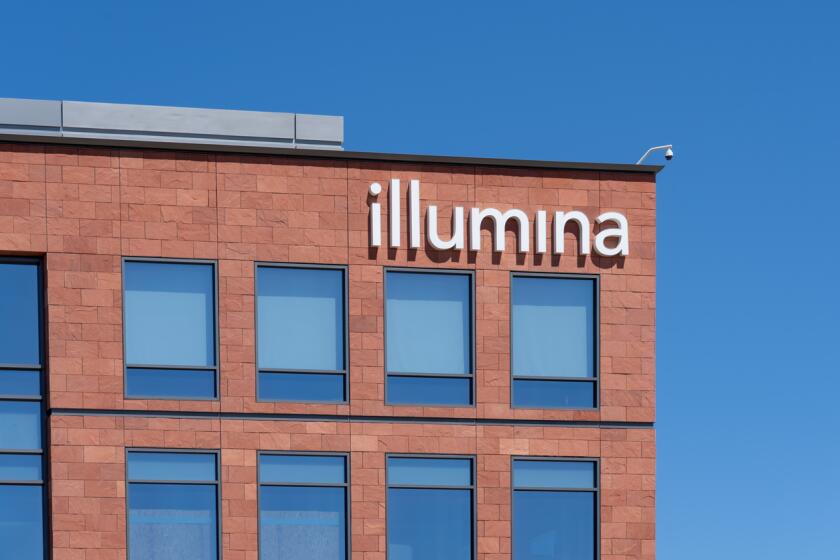Qualcomm facing challenges in China
Investors worried about technology royalties in fast growing market
Qualcomm blew out Wall Street’s expectation for sales and earnings for its fiscal third quarter, but its stock plunged on investor fears over its ability to collect technology licensing fees in the fast-growing China wireless market.
The company faces a lingering Chinese government probe, and it believes some companies in China that license its technology are under-reporting what they owe. It also has a dispute with one of its Chinese licensees.
Since wireless technology licensing drives the bulk of the company’s profits, any hiccup in that business worries investors. Qualcomm’s shares dropped 4 percent after earnings were released on Wednesday.
“This is guys in China basically saying, screw it, I’m not going to pay. What are you going to do about it?” said Stacy Rasgon, an analyst with Bernstein Research.
The company posted record revenue of $6.81 million, up 9 percent from the same quarter last year and ahead of analysts’ forecast of $6.53 billion.
Earnings came in at $2.47 billion for the quarter, or $1.44 per share, excluding certain charges. Analysts were expecting earnings of $1.22 per share, excluding charges.
Qualcomm shipped 225 million cellular radios in the quarter, up 31 percent from a year earlier. While smartphone sales in developed countries and the U.S. have slowed, sales in China have been on the rise as that country begins to roll out high-speed 4G LTE networks.
Besides selling chips, Qualcomm also makes money licensing its technology to wireless device makers, who pay a royalty based on the wholesale price of smartphones and tablets. About 70 companies in China have signed license agreements to use Qualcomm’s LTE technology.
Investors have questioned whether the company will be able to collect technology license fees en masse from Chinese device makers, which are generally hostile to paying for use of intellectual property.
For example, Qualcomm did not collect royalties on 3G smartphones sold by China Mobile because the nation’s largest cellular operator used a homegrown wireless standard.
“Chipsets are on fire, and that’s great,” said Rasgon. “But they took 215 million units out of their licensing guidance. And what they’re saying is we still think these units are going to be (sold) but the units reported to us are going to be down.”
Qualcomm’s licensing hurdles include an investigation from the China National Development and Reform Commission, the country’s anti-monopoly regulator. The NDRC probe centers on Qualcomm’s licensing business.
The company added that unlicensed phone makers in China may refuse to negotiate a licensing agreement with Qualcomm until the inquiry is resolved.
The company said the timing of resolving these issues remains uncertain. It lowered estimates for full-year reported wireless device sales – which drives licensing revenue — from 1.3 billion units to 1.085 billion.
That decline hurt its forecast for the upcoming quarter. Qualcomm now expects sales of $6.5 billion to $7.4 billion, and earnings per share of $1.20 to $1.35 per share, excluding charges.
Analysts had expected sales of $7.1 billion and earnings of $1.38 per share.
“The guidance is weaker,” said Ken Leon, an analyst with S&P Capital IQ. “The licensing is a risk as it relates to China, and licensing is the largest contributor to operating income, even though the semiconductor business is the largest contributor to revenue.”
For its full fiscal year ending in September, the company increased estimated earnings per share to $5.21 to $5.36 to reflect its strong third quarter results. Previously, it forecast earnings at $5.13 per share.
“Although we have lowered our near-term financial outlook for the licensing business, we are pleased to be raising our fiscal year earnings per share guidance on better than expected performance in our semiconductor business,” said Qualcomm Chief Executive Steve Mollenkopf.
Qualcomm released results after markets closed. It shares ended trading at $81.60 but fell to $78.35 in early after hours trading
Get U-T Business in your inbox on Mondays
Get ready for your week with the week’s top business stories from San Diego and California, in your inbox Monday mornings.
You may occasionally receive promotional content from the San Diego Union-Tribune.










